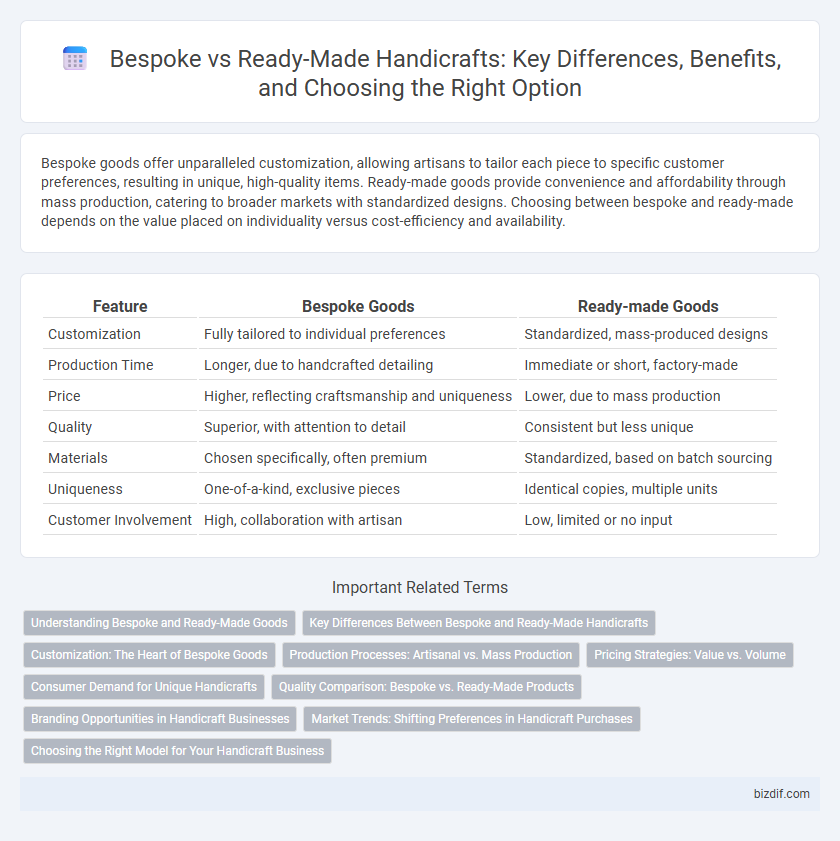Bespoke goods offer unparalleled customization, allowing artisans to tailor each piece to specific customer preferences, resulting in unique, high-quality items. Ready-made goods provide convenience and affordability through mass production, catering to broader markets with standardized designs. Choosing between bespoke and ready-made depends on the value placed on individuality versus cost-efficiency and availability.
Table of Comparison
| Feature | Bespoke Goods | Ready-made Goods |
|---|---|---|
| Customization | Fully tailored to individual preferences | Standardized, mass-produced designs |
| Production Time | Longer, due to handcrafted detailing | Immediate or short, factory-made |
| Price | Higher, reflecting craftsmanship and uniqueness | Lower, due to mass production |
| Quality | Superior, with attention to detail | Consistent but less unique |
| Materials | Chosen specifically, often premium | Standardized, based on batch sourcing |
| Uniqueness | One-of-a-kind, exclusive pieces | Identical copies, multiple units |
| Customer Involvement | High, collaboration with artisan | Low, limited or no input |
Understanding Bespoke and Ready-Made Goods
Bespoke goods are handcrafted products tailored specifically to individual preferences, ensuring unique design and personalized quality that mass-produced ready-made goods often lack. Ready-made goods are manufactured in large quantities with standardized specifications, prioritizing affordability and availability over customization. Understanding these distinctions helps consumers choose between exclusivity and convenience in the handicraft market.
Key Differences Between Bespoke and Ready-Made Handicrafts
Bespoke handicrafts are custom-made items tailored to individual specifications, emphasizing uniqueness, craftsmanship, and personalized details, while ready-made handicrafts are mass-produced with standardized designs focusing on accessibility and affordability. Bespoke pieces often involve traditional techniques and longer production times, offering exclusivity and a strong connection to cultural heritage. In contrast, ready-made goods prioritize efficiency and uniformity, appealing to broader markets but often lacking the unique story and intricate artistry found in bespoke creations.
Customization: The Heart of Bespoke Goods
Customization defines bespoke goods, allowing artisans to tailor each product uniquely to individual preferences, materials, and specifications. Unlike ready-made goods, which follow standardized designs for mass production, bespoke items embrace personal expression and functional requirements. This deep customization enhances the value, uniqueness, and emotional connection of handcrafted products.
Production Processes: Artisanal vs. Mass Production
Bespoke goods are crafted through artisanal production processes, emphasizing hand-made techniques, personalized design, and meticulous attention to detail, resulting in unique, high-quality products. Ready-made goods rely on mass production methods, utilizing automated machinery and assembly lines to produce large quantities of standardized items efficiently and cost-effectively. This contrast in production processes directly impacts product individuality, craftsmanship, and customization options between bespoke and ready-made goods.
Pricing Strategies: Value vs. Volume
Bespoke goods command premium pricing reflecting their unique craftsmanship, personalized design, and limited production, emphasizing value over volume. Ready-made goods rely on mass production and economies of scale to offer lower prices, targeting higher sales volume and broader market accessibility. Pricing strategies in handicrafts must balance exclusivity and personalization against affordability and availability to optimize revenue.
Consumer Demand for Unique Handicrafts
Consumer demand for unique handicrafts drives the preference for bespoke goods over ready-made products, as customers seek personalized items that reflect individual tastes and cultural heritage. Bespoke handicrafts offer exclusive designs and superior craftsmanship, catering to a niche market valuing authenticity and artistic expression. Ready-made goods fulfill mass-market needs but often lack the distinctiveness and emotional connection associated with custom-made handicrafts.
Quality Comparison: Bespoke vs. Ready-Made Products
Bespoke goods typically offer superior quality due to personalized craftsmanship, attention to detail, and the use of premium materials tailored to individual specifications. Ready-made products often compromise on uniqueness and durability as they are mass-produced with standardized materials to meet general market demands. The meticulous handwork in bespoke items ensures longevity and exclusivity, setting them apart in quality from ready-made counterparts.
Branding Opportunities in Handicraft Businesses
Bespoke goods in handicraft businesses offer unique branding opportunities by emphasizing handcrafted quality and personalized customer experiences, setting the brand apart in a crowded market. Ready-made goods allow for consistent branding through standardized designs and faster production, enabling scalable marketing strategies. Leveraging storytelling around craftsmanship and customization enhances brand identity and customer loyalty in bespoke handicraft ventures.
Market Trends: Shifting Preferences in Handicraft Purchases
Market trends reveal a growing consumer preference for bespoke goods due to their uniqueness, superior craftsmanship, and personalized appeal in the handicraft sector. Ready-made goods remain popular for their affordability and immediate availability but face declining demand as buyers increasingly seek authenticity and individuality. Handicraft markets are adapting by blending traditional techniques with customization options to meet the evolving demand for personalized products.
Choosing the Right Model for Your Handicraft Business
Bespoke goods offer personalized craftsmanship tailored to individual customer preferences, enhancing exclusivity and allowing artisans to charge premium prices, while ready-made goods provide scalability and faster production suitable for mass markets. Selecting the right model depends on your target audience; niche markets often value bespoke items for their uniqueness, whereas broader markets demand the affordability and availability of ready-made products. Balancing customization with production efficiency is crucial to optimize profitability and brand positioning in the handicraft industry.
Bespoke Goods vs Ready-made Goods Infographic

 bizdif.com
bizdif.com